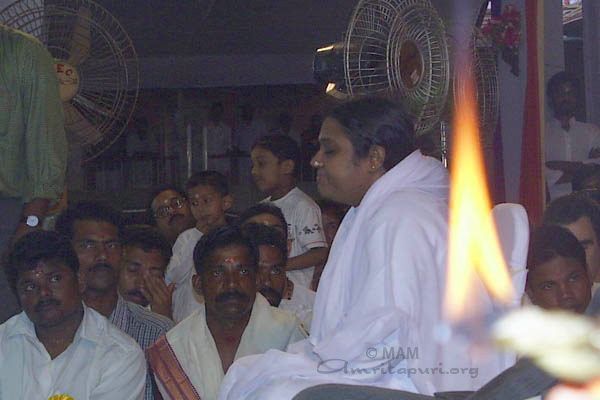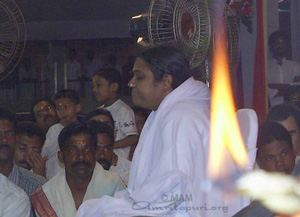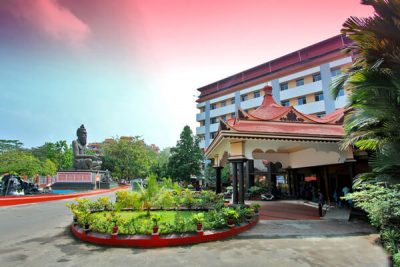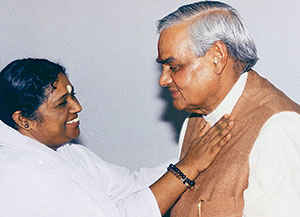Message Amma gave in the souvenir during the inauguration of AIMS, super specialty hospital in Kochi, Kerala in 1998.
Darling children,
Some of Amma’s children may doubt, “What need does an ashram have to run hospitals?” Children, didn’t the Lord incarnate as Dhanvantara Moorthi? Thus, He showed through His own example that medicine and treatment are very relevant. The shastras also tell that it is important to sustain the body. This seems to be correct if we also examine the history of Mahatmas who have lived until now.
Sri Ramakrishna, Ramana Maharshi and Swami Vivekananda all underwent treatment when they fell ill. They did not refrain from treatment, saying, “I am Brahman, not the body.”

Since it is the nature of the body to become sick, it’s important to preserve the body by undergoing the required treatment. We can make fire only if there is firewood. Likewise, in order to know the Atma, it is necessary to preserve the instrument. Therefore hospitals and treatment are not contradictory to or incompatible with spirituality. All those are helpful in maintaining the body, which is a means to know the Self.
There are a lot of children who stay in the ashram who were inspired by meeting Amma. They are both Western and Indian. Among them, there are those that have been doctors. They want to stay with Amma. And Amma wanted to give them an opportunity to engage in selfless service to the world. How many people are there who can meditate 24 hours a day? Very few. That being so, what will the remaining majority do after their initial meditation hours? If one sits idle, a lot of unwanted thoughts will crop up in the mind. These thoughts are also a form of action. In such a situation, if they do some service with their hands and feet it will benefit them as well as the world.
There may be people who say, “We desire only liberation, we do not need any treatment. If we die out of sickness, let it be.” Amma would say that to attain liberation, it requires the grace of the Lord. In order to receive grace one should have mental purity, there is need for desireless service. One becomes deserving for grace only through selfless, unmotivated actions. To do such selfless actions, one needs to have a body. To maintain the body, it is necessary to take treatment at the time of illness.
Jnana (knowledge) and bhakti (devotion) are two sides of a coin. But nishkama karma (desireless action) is the seal on that coin. A coin becomes valuable only if there is a seal on it. Devotion and action are the two wings of a bird and knowledge is its tail. Only if these three are there, can it soar up to the heights.
Jnana (knowledge) and bhakti (devotion) are two sides of a coin. But nishkama karma (desireless action) is the seal on that coin. A coin becomes valuable only if there is a seal on it. – Amma
In the olden days, disciples used to engage in service activities while living in gurukulas. They did not look upon it merely as action, but as a service to their Guru. In fact, action performed in dedication to the Guru is not action. It is real meditation. It is usually said that a disciple should serve the ashram considering it as the body of the Guru. Thereafter, he should be able to love and serve the whole world looking upon it as the body of the Guru. That is true meditation. The unbroken remembrance of that principle itself is meditation.
Everyone knows the story of the disciple who laid himself down in the Guru’s paddy field in order to prevent the water from entering the field through a fissure in the ridge. The disciple did not consider the field as just a field. He was ready to sacrifice his own life to protect the harvest. Such an action cannot be called just an action. It is a moment when one forgets oneself. It is the peak of meditation. In the olden days, it was the disciples who did all the work in the gurukulas. They used to bring firewood from the forest; they used to tend to the cows. For them, each action was a sadhana, not mere action. For them it was meditation and service to the Guru.
There are hundreds of educated and experienced children who have come to join the ashram. How will it be possible for all of them to sit and meditate for the whole time? It is far better to engage in some activities beneficial to the world rather than sitting idle and polluting the mind with unnecessary thoughts. Each one can do service to his or her capability while continuing mantra japa. That will benefit oneself as well as the world. That brings mental purity and through this one progresses towards the goal. Nobody can attain the goal without putting forth effort. Whether it is spirituality or materialism, effort is unavoidable. What fulfils the effort and makes it sweet is the grace of God. And it is the selfless attitude that makes one deserving to receive the grace of God.
While engaged in selfless service, some of my children may fear, “Oh, I don’t get even a moment to think about the Lord because of all this work. All my time is lost on these activities. Will my life be wasted?” and so on. Children, one who does desireless service need not wander anywhere in search of God. The real temple of God is in the heart of one who is engaged in unmotivated service.
That is how so many institutions have come up in this ashram. A few children who were experienced in the education field joined here. They started educational institutions. Those who have studied computer science started computer institutes. The children with engineering degrees began constructing buildings for the ashram. And when children who were doctors joined here, the ashram began to run hospitals. These activities are not just work for them, but part of their sadhana. It is meditation and service to the Guru. Amma would say that even the breath of one who serves the world, forgetting oneself, is beneficial in every way.
A few Vedantins would say that action, through service to the world, will lead to new vasanas (tendencies). It is just an argument of the lazy. The Lord says in the Gita, “O Arjuna, in the three worlds, I do not have any necessity to engage in action. Yet I continue to engage in action.” Performing action without attachment, with the attitude of “He, not I, is the doer, and I am merely an instrument” does not bind one. It leads only to liberation. Everywhere in the Gita, self-effort is given utmost importance.
Even the Vedantins who say, “I am Brahman, what need is there for me to engage in action?” seek treatment when they become sick. They want their meals ready exactly by 12 o’clock. They want their mattresses ready by 10 in the evening. If such services are required by them, why don’t they think that such service is needed for the world also? If one has the attitude that everything is the non-dual Self, then one has nothing to reject but accepts everything. Desire-lessness is the true measure of spiritual greatness.
If one has the attitude that everything is the non-dual Self, then one has nothing to reject but accepts everything. Desire-lessness is the true measure of spiritual greatness. – Amma
Some others say, “Sannyasins should retire to the Himalayas.” Children, selfless service to the world is the beginning of Self-inquiry. That is also the culmination of it. Our duty towards God is our compassion to the poor and suffering. Our greatest obligation in this world is to serve our fellow beings. God does not require anything from us. He is ever full. The sun doesn’t require the light of a candle. God is the sustainer of the whole world. He is the embodiment of love and compassion. We can grow only if we imbibe that love and compassion. A sannyasi strives to love without attachment and to serve without expectation. He gives up the burden of selfishness and accepts the burden of serving the world.
Only if we love and serve the entire creation can we become a fit vessel for His grace. Engaging in meditation without purifying the mind through desireless service is fruitless, like pouring milk into an unclean vessel. But we often forget this truth. We forget our obligation to serve the suffering people. We go to temples, circumambulate the temple, repeating the names of the Lord; however, we drive away invalids stretching out their hand for a morsel of food. Children, real worship of the Lord is the compassion we extend towards the suffering.
Once a man wandered everywhere in search of God. Nowhere could he see the Lord. Finally, exhausted he sat beneath a tree. He happened to see a husband and wife pass by him in total joy. Seeing the joy in their faces, he wanted to know where they were going. He followed them and reached a colony of lepers. This couple cleansed the wounds of the lepers and applied medicine to them. They served the food they had brought. They consoled them with loving words. Seeing all this the man in search of God could not contain his joy. He cried out, “I have seen God! I have seen God!” Hearing him, others thought that he was mad. “Where is the God that you have seen?” they asked him. The man replied, “Where there is compassion, God is there. God dwells in the hearts of the compassionate. Children, consoling the sorrowful is a sadhana greater than meditation. Meditation is as invaluable as gold. However, if one has compassion for his fellow beings, it is like gold with fragrance. Its value and greatness is beyond all words. Therefore, my children, enter into the midst of the suffering and sorrowful.
However, even as you serve them, try to give them good samskaras also. It is not enough to give good food to the hungry. Even when the hunger is appeased, after sometime, one will again feel hungry. Therefore, you should teach them spiritual principles. Make them understand the nature of the world and the purpose of human life. If so, in all circumstances they will learn to lead their lives in happiness and contentment. Only then will your service become complete.
Today, everyone is interested in looking at those who are higher than them. Yet they are unconcerned about the plight of these who are less fortunate than them. Amma remembers a story: There was a woman who worked as a maid in a rich man’s house. She was a widow and her only daughter was handicapped. The woman would bring her daughter along when she went to work. The rich man also had a daughter. This girl loved the maid’s daughter very much. She would shower her with love, telling stories and giving her delicious edibles. The father didn’t like this at all. Everyday, he would scold his daughter, “Daughter, you should not play with that handicapped, dirty girl. Why do you spend so much time with her?” His daughter wouldn’t answer. The father thought it was because she didn’t have a playmate that she mixed with the servant’s daughter. He brought the daughter of his friend to the house. His daughter greeted the new child and was friendly with her. However, she continued to spend a lot of time with the servant’s daughter, showering her with love as before. Then the father asked, “Daughter, don’t you like the friend who I’ve brought for you?” The daughter said, “I liker the girl you brought for me, but may I tell you one thing? Even if I don’t love the girl you brought, there are many others who are ready to love her. On the other hand, if I don’t love this girl, who else will love her? She has no other relative.”
Children, we should cultivate a heart filled with compassion. We should thirst to serve the suffering people. In any circumstance, we should have the readiness to engage in service for the good of the world. – Amma
Children, this should be the attitude that we have. We should love the poor and suffering whole-heartedly. We should uplift them, going down to their level. That is our obligation to God.
Some of you may ask, “If selfless service is so great, what is the need for meditation and tapas (austerities)?” Children, if an ordinary man is like an electrical post, a tapasvi is like a transformer. One can acquire immense power through tapas. It is like conserving energy, constructing a dam over a river with nine tributaries. However, one should be ready to dedicate even the power acquired through tapas for the good of the world. One should be prepared to sacrifice everything, like an incense stick which spreads out its fragrance around the world while burning itself out. God’s grace will definitely flow to such an expansive heart.
Children, we should cultivate a heart filled with compassion. We should thirst to serve the suffering people. In any circumstance, we should have the readiness to engage in service for the good of the world.
Many people meditate in order that the third eye will open after the two eyes that see the world go blind. Such a thing will never happen. We can never close our eyes to the world in the name of spirituality. Self-Realization is the ability to see ourselves in all beings, even while our two eyes are wide open. We should be able to love and serve others, seeing ourselves in them. That is the fulfilment of spiritual practice.



